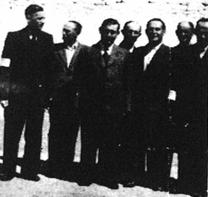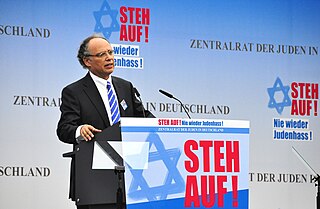
A Judenrat was an administrative body established in German-occupied Europe during World War II which purported to represent a Jewish community in dealings with the Nazi authorities. The Germans required Jews to form Judenräte across the occupied territories at local and sometimes national levels.

The Central Council of Jews in Germany is a federation of German Jews. It was founded on 19 July 1950, as a response to the increasing isolation of German Jews by the international Jewish community and increasing interest in Jewish affairs by the (West) German government. Originally based in the Rhenish areas, it transferred its seat to Berlin after the Reunification of Germany (1990). As of 2015 the Jewish community in Germany has around 100,000 registered members, although far more Jews live in the country without belonging to a synagogue. From its early years, the organisation has received strong financial and moral support from the government. Since the end of November 2014, Josef Schuster, an internist from Würzburg, has been president of the Zentralrat. He follows Dieter Graumann, who was the incumbent from November 2010 to November 30th 2014.

The Union progressiver Juden in Deutschland is a "Körperschaft des öffentlichen Rechts", a publicly chartered association, founded in 1997 as the congregational arm of Liberal Judaism in Germany. It is headed by Irith Michelsohn and has around 5,200 members. It is an affiliate of the World Union for Progressive Judaism. Rabbi Walter Homolka was former President and was also the most senior rabbinic figure associated with the UPJ, and the Abraham-Geiger-Kolleg serves as rabbinical seminary since 1999.

Paul Spiegel was leader of the Central Council of Jews in Germany and the main spokesman of the German Jews. He was widely praised for his leadership of the German Jewish community, which had grown from the remnants left by the Nazis into the third largest Jewish community in western Europe.

Ignatz Bubis, German Jewish leader, was the influential chairman of the Central Council of Jews in Germany from 1992 to 1999. In this capacity he led a public campaign against German antisemitism. Bubis's high profile both in Frankfurt and nationwide involved him in a number of public controversies.

Volker Beck is a German politician. From 1994 to 2017, he was a member of the Bundestag, the German federal parliament, for the Green Party. Beck served as the Green Party Speaker for Legal Affairs from 1994 to 2002, and as the Green Party Chief Whip in the Bundestag till 2013. He was also spokesperson for the Green Parliamentary Group for interior affairs and religion.

Conseil représentatif des institutions juives de France (CRIF) is an umbrella organization of other groups representing the interests of French Jews.
The Reich Representation of German Jews was a Jewish umbrella organization founded in Germany on 17 September 1933. It was established to coordinate and represent the activities of Jewish political and religious groups, with headquarters in Berlin, and provide legal defence in the face of growing persecution of the Nazi era. The organization was constantly being reorganized and remained active in communities nationwide until after the Holocaust. It ceased to exist in June 1943. The Berlin Rabbi Leo Baeck was elected president of the Reichsvertretung with Otto Hirsch acting as its chairman.

Heinz Galinski was president of the Central Council of Jews in Germany from 1954 to 1963 and 1988 until his death in 1992, and Holocaust survivor.

Charlotte Knobloch is the former President of Central Council of Jews in Germany from 2006 to 2010. She is also Vice President of the European Jewish Congress and the World Jewish Congress. She has for many years been one of the primary leaders of the Jewish community in Munich, as President of the Israelitische Kultusgemeinde München und Oberbayern since 1985.
Norbert Wollheim was a chartered accountant, tax advisor, previously a board member of the Central Council of Jews in Germany and a functionary of other Jewish organisations.

Ralph Giordano was a German writer and publicist.

Werner Nachmann, was a German entrepreneur and politician, and was president of the Central Council of Jews in Germany from 1969 to 1988. He was born in Karlsruhe.

Jürgen Linden is a German politician and was Lord Mayor of Aachen from 1989 to 2009.
Central Council may refer to:
Aktion Deutschland Hilft e.V. – Bündnis deutscher Hilfsorganisationen (ADH) is a connection of German aid agencies for humanitarian aid, with the target of helping faster and more efficiently through coordination and combination of efforts in case of a disaster and to raise donations together. The association is headquartered in Bonn.

Salomon Korn is a German architect and an honorary senator of Heidelberg University. Since 1999 he has served as chairman of the Jewish Community of Frankfurt am Main and since 2003 as vice president of the Central Council of Jews in Germany.

Dieter Graumann is an Israeli/German jurist and economist. From 28 November 2010 to 30 November 2014, he was President of the Central Council of Jews in Germany and has been Vice President of the World Jewish Congress since 6 May 2013. He succeeded Charlotte Knobloch in both positions.

Helge Frederik Lindh is a German politician of the Social Democratic Party (SPD) who has been serving as a member of the Bundestag since 2017, representing the Wuppertal I district.
DenkOrt Deportationen 1941–1944 is a Holocaust memorial in Würzburg, Germany, commemorating the deportation of Jews from Würzburg and from the 109 surrounding communities in Lower Franconia where Jews once lived.















